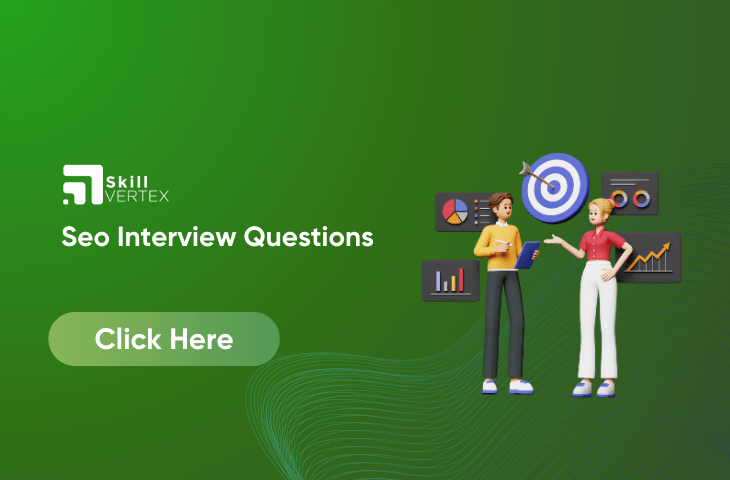1. What is on-page SEO? State some on-page SEO techniques?
2. What is off-page SEO? Name some off-page SEO methods?
3. What makes a website search engine friendly?
4. Give a brief about the SEO tools that you are most familiar with?
5. What are the attributes of an SEO-friendly URL?
6. What do you mean SERP?
7. How do you measure SEO success?
8. What is a Google bot?
9. What is robot.txt?
10. What are meta tags?
11. What are the most important Google ranking factors?
12. What is site speed?
13. How do you optimize site speed?
14. What do you mean by redirecting a page? Suggest some methods to do that?
15. What do you mean by link-building? Why does it matter?
16. Suggest some tools to check the backlinks of other sites?
17. What are keywords? Name a few types of keywords.
18. What is a long-tail keyword?
19. What is keyword research? Suggest some tools to carry out keyword research
20. Name some SEO plugins in WordPress?
21. What are some common SEO mistakes to avoid?
22. What do you mean by white-hat SEO?
23. What is black-hat SEO? Which black-hat tactics should you avoid?
24. Shed some light on the relationship between SEO and SEM?
25. What are the inherent qualities and skills for an SEO role?
26. What is a canonical URL?
27. What is cloaking?
28. What do you mean by keyword stemming?
29. What are rich snippets?
30. What is Google’s rich answer box?
31. What is Google’s autocomplete feature?
33. What is an XML site map? Why is it important?
34. What is a link audit?
35. What is a disavow tool?
36. What do you mean by the Google penalty? How can you avoid it?
37. Differentiate between do-follow and no-follow links? Which is better?
38. How can you deal with link penalties?
39. Define bad links.
40. Name some of the best techniques used for off-page SEO?
41. Talk about the massive Google update that impacted SEO?
42. Elucidate some of the biggest SEO trends in the current year?
43. Explain the Google Ads campaign?
44. Elucidate the method to check whether the SEO campaign is working or not?
45. Tell me something about Google my Business (GMB).
46. How can you benefit from the competitive analysis?
47. What is RankBrain?
48. What is Page Rank?
49. What is PBN?‘
50. What is an HTTPS/SSL Update?
51. What is EAT? Why Google gives it preference?
Seo Interview Questions And Answers
- On-Page SEO:
Ans.
- Definition: On-page SEO refers to the optimization of individual web pages to improve their search engine rankings and attract organic traffic.
- Techniques:
- Keyword optimization in titles, headers, and content.
- Quality and relevant content creation.
- Proper use of HTML tags (H1, H2, etc.).
- Optimized images with descriptive alt text.
- User-friendly URLs.
- Internal linking for navigation.
- Mobile responsiveness.
- Page load speed optimization.
2.Off-Page SEO:
Ans.
- Definition: Off-page SEO involves optimizing elements outside of the website itself to improve its visibility and credibility.
- Methods:
- Building high-quality backlinks.
- Social media marketing and engagement.
- Influencer marketing.
- Guest blogging.
- Social bookmarking.
- Online reviews and testimonials.
- Brand mentions and citations.
3.Making a Website Search Engine Friendly:
Ans.
- Clear and logical site structure.
- Quality and relevant content.
- Proper use of HTML tags.
- Fast page load speed.
- Mobile responsiveness.
- User-friendly URLs.
- Effective use of keywords.
- High-quality backlinks.
- Social media presence.
4.SEO Tools:
Ans.
- Google Analytics: Tracks website traffic and user behavior.
- Google Search Console: Provides insights into how Googlebot views your site.
- SEMrush: Offers keyword research, backlink analysis, and competitor insights.
- Moz: Provides tools for link building, keyword research, and site audits.
- Yoast SEO: A WordPress plugin for on-page SEO analysis.
- Ahrefs: Focuses on backlink analysis, competitor research, and keyword tracking.
5.Attributes of an SEO-Friendly URL:
Ans.
- Short and descriptive.
- Contains relevant keywords.
- Avoids unnecessary parameters or session IDs.
- Uses hyphens to separate words.
- Provides a clear hierarchy of information.
6.SERP (Search Engine Results Page):
Ans.
- SERP is the page displayed by search engines in response to a user’s query.
- It includes organic search results, paid advertisements, featured snippets, and other rich features.
7.Measuring SEO Success:
Ans.
- Organic traffic growth.
- Keyword rankings improvement.
- Click-through rate (CTR) from search results.
- Conversion rate from organic traffic.
- Backlink quality and quantity.
- Social media engagement.
- Site speed and user experience metrics.
8.Google Bot:
Ans.
- Googlebot is Google’s web crawling bot that indexes web pages for the Google search engine.
- It follows links on websites and collects information about the pages to update Google’s index.
9.robots.txt:
Ans.
- A
robots.txtfile is used to instruct web crawlers which pages or sections of a website should not be crawled or indexed. - It helps control access to content for search engines.
10.Meta Tags:
Ans.
- Meta tags are HTML elements that provide metadata about a web page.
- Common meta tags include title, description, and keywords.
- They influence how a page appears in search engine results.
11.Most Important Google Ranking Factors:
Ans.
- Content quality and relevance.
- Backlink quality and quantity.
- Page load speed.
- Mobile-friendliness.
- Secure and accessible website.
- User experience (including dwell time and bounce rate).
11.Site Speed:
Ans.
- Site speed refers to how fast a website loads.
- It is a crucial factor for both user experience and search engine rankings.
- Google uses site speed as a ranking factor, and faster-loading sites tend to have better user engagement.
Hello, I’m Hridhya Manoj. I’m passionate about technology and its ever-evolving landscape. With a deep love for writing and a curious mind, I enjoy translating complex concepts into understandable, engaging content. Let’s explore the world of tech together

